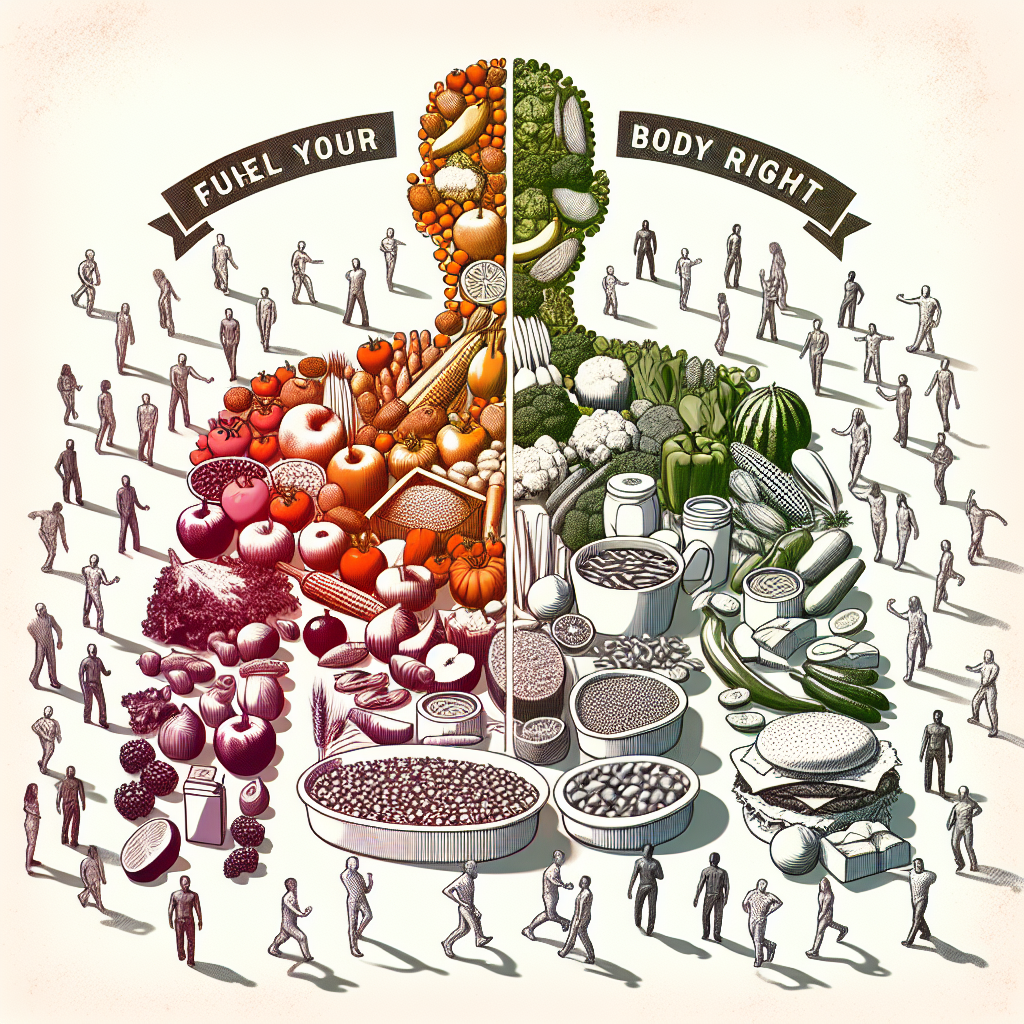Fuel Your Body Right: The Essential Components of a Balanced Diet

A balanced diet is crucial for overall health and wellness. It provides the necessary nutrients, vitamins, and minerals that our bodies need to function properly. A balanced diet not only helps us maintain a healthy weight, but it also improves our energy levels and prevents chronic diseases.
When we consume a variety of foods from different food groups, we ensure that our bodies receive all the essential nutrients they need. This includes carbohydrates, proteins, fats, vitamins, minerals, water, fiber, and antioxidants. Each of these nutrients plays a vital role in fueling our bodies and keeping us healthy.
Key Takeaways
- A balanced diet is important for fueling your body and maintaining optimal health and wellness.
- Carbohydrates are the primary energy source for your body and should make up a significant portion of your diet.
- Proteins are essential for building muscle and repairing tissue in your body.
- Fats are necessary for energy storage and hormone production, but should be consumed in moderation.
- Vitamins and minerals are crucial for optimal body functioning, and water is the most important nutrient for hydration and overall health.
Carbohydrates: The Primary Energy Source for Your Body
Carbohydrates are the primary source of energy for our bodies. They are broken down into glucose, which is used by our cells to produce energy. There are two types of carbohydrates: simple carbohydrates and complex carbohydrates.
Simple carbohydrates are found in foods such as fruits, vegetables, and dairy products. They provide quick energy but are often low in nutrients. On the other hand, complex carbohydrates are found in foods like whole grains, legumes, and starchy vegetables. They provide sustained energy and are rich in fiber and other essential nutrients.
Including healthy sources of carbohydrates in our diet is important for maintaining energy levels throughout the day. Some examples of healthy carbohydrate sources include whole wheat bread, brown rice, quinoa, sweet potatoes, and oats.
Proteins: The Building Blocks of Muscle and Tissue Repair
Proteins are essential for the growth and repair of muscles and tissues in our bodies. They are made up of amino acids, which are the building blocks of protein. There are two types of proteins: complete proteins and incomplete proteins.
Complete proteins contain all nine essential amino acids that our bodies cannot produce on their own. They are found in animal-based foods such as meat, poultry, fish, eggs, and dairy products. Incomplete proteins, on the other hand, lack one or more essential amino acids. They are found in plant-based foods such as beans, lentils, tofu, and quinoa.
Including healthy sources of protein in our diet is important for muscle growth and repair. Some examples of healthy protein sources include lean meats, fish, eggs, dairy products, beans, lentils, and nuts.
Fats: The Essential Nutrient for Energy Storage and Hormone Production
| Nutrient | Function | Food Sources |
|---|---|---|
| Saturated Fats | Energy storage, hormone production, cell membrane structure | Butter, cheese, fatty meats, coconut oil |
| Monounsaturated Fats | Energy storage, hormone production, cell membrane structure | Olive oil, avocado, nuts, seeds |
| Polyunsaturated Fats | Energy storage, hormone production, cell membrane structure, brain function | Fatty fish, flaxseeds, chia seeds, walnuts |
| Omega-3 Fatty Acids | Brain function, heart health, inflammation reduction | Fatty fish, flaxseeds, chia seeds, walnuts |
| Trans Fats | Increase risk of heart disease, inflammation | Fried foods, processed snacks, margarine |
Fats are an essential nutrient that our bodies need for energy storage and hormone production. There are three types of fats: saturated fats, unsaturated fats, and trans fats.
Saturated fats are found in animal-based foods such as meat, poultry, and dairy products. They can increase the risk of heart disease when consumed in excess. Unsaturated fats, on the other hand, are found in plant-based foods such as nuts, seeds, avocados, and olive oil. They are healthier fats that can help reduce the risk of heart disease.
Trans fats are artificial fats that are created through a process called hydrogenation. They are found in processed foods such as fried foods, baked goods, and margarine. Trans fats should be avoided as they can increase the risk of heart disease.
Including healthy sources of fats in our diet is important for energy storage and hormone production. Some examples of healthy fat sources include avocados, nuts, seeds, olive oil, and fatty fish like salmon.
Vitamins: The Micronutrients Your Body Needs for Optimal Functioning
Vitamins are micronutrients that our bodies need in small amounts for optimal functioning. They play a crucial role in various bodily processes such as metabolism, immune function, and cell growth.
There are two types of vitamins: fat-soluble vitamins and water-soluble vitamins. Fat-soluble vitamins, such as vitamins A, D, E, and K, are stored in the body’s fat tissues and can be stored for longer periods. Water-soluble vitamins, such as vitamin C and the B vitamins, are not stored in the body and need to be replenished regularly.
Including healthy sources of vitamins in our diet is important for overall health and wellness. Some examples of healthy vitamin sources include fruits, vegetables, whole grains, dairy products, and lean meats.
Minerals: The Essential Nutrients for Strong Bones, Teeth, and Immune System

Minerals are essential nutrients that our bodies need in small amounts for various functions. They play a crucial role in maintaining strong bones and teeth, regulating fluid balance, and supporting the immune system.
There are two types of minerals: macrominerals and trace minerals. Macrominerals, such as calcium, magnesium, potassium, and sodium, are needed in larger amounts. Trace minerals, such as iron, zinc, copper, and selenium, are needed in smaller amounts.
Including healthy sources of minerals in our diet is important for strong bones, teeth, and a healthy immune system. Some examples of healthy mineral sources include dairy products, leafy green vegetables, nuts, seeds, lean meats, and whole grains.
Water: The Most Important Nutrient for Hydration and Body Functioning
Water is the most important nutrient for our bodies. It plays a crucial role in maintaining hydration and supporting various bodily functions such as digestion, circulation, temperature regulation, and waste removal.
Staying hydrated throughout the day is important for overall health and wellness. It is recommended to drink at least 8 cups (64 ounces) of water per day. However, individual water needs may vary depending on factors such as activity level, climate, and overall health.
Tips for staying hydrated throughout the day include carrying a water bottle with you at all times, drinking water before, during, and after exercise, and consuming water-rich foods such as fruits and vegetables.
Fiber: The Nutrient for Digestive Health and Weight Management
Fiber is a nutrient that is important for digestive health and weight management. It helps regulate bowel movements, prevents constipation, and promotes a healthy gut microbiome.
There are two types of fiber: soluble fiber and insoluble fiber. Soluble fiber dissolves in water and forms a gel-like substance in the digestive tract. It can help lower cholesterol levels and regulate blood sugar levels. Insoluble fiber does not dissolve in water and adds bulk to the stool, promoting regular bowel movements.
Including healthy sources of fiber in our diet is important for digestive health and weight management. Some examples of healthy fiber sources include fruits, vegetables, whole grains, legumes, nuts, and seeds.
Antioxidants: The Nutrients for Fighting Inflammation and Preventing Disease
Antioxidants are nutrients that help fight inflammation and prevent damage to our cells caused by free radicals. They play a crucial role in reducing the risk of chronic diseases such as heart disease, cancer, and neurodegenerative disorders.
There are various types of antioxidants, including vitamins A, C, and E, as well as minerals such as selenium and zinc. Including healthy sources of antioxidants in our diet is important for overall health and wellness.
Some examples of healthy antioxidant sources include berries, dark chocolate, green tea, nuts, seeds, and colorful fruits and vegetables.
How to Achieve a Balanced Diet for Optimal Health and Wellness
Achieving a balanced diet is essential for optimal health and wellness. Here are some tips for incorporating all essential nutrients into your diet:
1. Include a variety of foods from different food groups in your meals.
2. Choose whole foods over processed foods whenever possible.
3. Consume a mix of carbohydrates, proteins, and fats in each meal.
4. Include a variety of fruits and vegetables in your diet to ensure you get a wide range of vitamins and minerals.
5. Drink plenty of water throughout the day to stay hydrated.
6. Include sources of fiber in your diet to promote digestive health and weight management.
7. Incorporate sources of antioxidants in your diet to fight inflammation and prevent disease.
Remember, moderation and variety are key when it comes to achieving a balanced diet. It’s important to listen to your body’s hunger and fullness cues and make choices that nourish your body and support your overall health and wellness.
If you’re looking to maintain a balanced diet, it’s important to understand the essentials. One article that can provide valuable insights is “The Ultimate Guide to a Balanced Diet for Newbies” from Healthy Diet Doctor. This comprehensive guide covers everything from the benefits of a balanced diet to tips on meal planning and portion control. Whether you’re just starting your wellness journey or looking to make healthier lifestyle changes, this article is a must-read. Check it out here.
FAQs
What is a balanced diet?
A balanced diet is a diet that contains all the essential nutrients in the right proportions to maintain good health and prevent diseases.
What are the essential nutrients that should be included in a balanced diet?
The essential nutrients that should be included in a balanced diet are carbohydrates, proteins, fats, vitamins, minerals, and water.
Why is a balanced diet important?
A balanced diet is important because it provides the body with all the essential nutrients it needs to function properly. It helps maintain a healthy weight, prevents chronic diseases, and improves overall health and well-being.
What are the benefits of a balanced diet?
The benefits of a balanced diet include maintaining a healthy weight, reducing the risk of chronic diseases such as heart disease, diabetes, and cancer, improving brain function, boosting energy levels, and improving overall health and well-being.
What are some examples of foods that should be included in a balanced diet?
Some examples of foods that should be included in a balanced diet are fruits, vegetables, whole grains, lean proteins, low-fat dairy products, and healthy fats such as nuts and seeds.
What are some tips for maintaining a balanced diet?
Some tips for maintaining a balanced diet include eating a variety of foods from all food groups, limiting processed and high-fat foods, drinking plenty of water, and practicing portion control. It is also important to limit alcohol consumption and to be physically active on a regular basis.